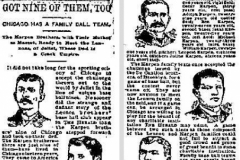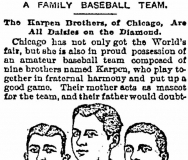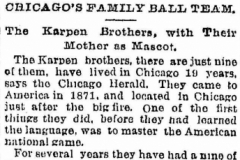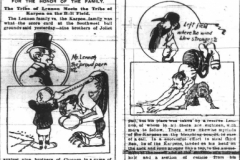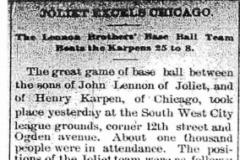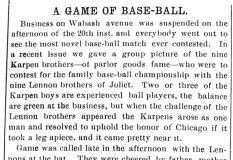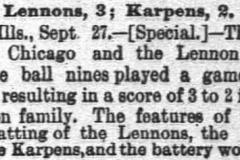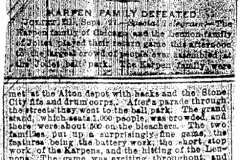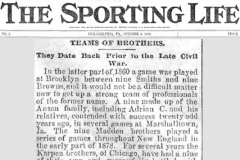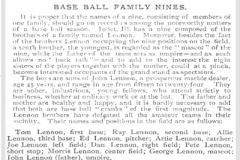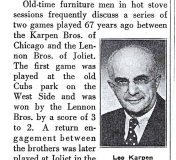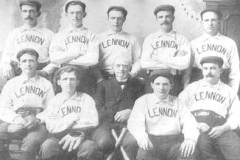The Karpen Nine—Part of Baseball’s Lore: 1888-1890
The Toughest of the Toughs. Hometown baseball in the nineties was rough and rowdy and hugely popular. A keg of beer sometimes stood just to the side of third base for encouragement. It was call a German Disturber, and any man who made it to third was entitled to a dipperful. Family teams barnstormed the country. …The Karpen Brothers, German immigrants who mastered baseball before they learned English….—Geoffrey Ward’s, Baseball: An Illustrated History, based on Ken Burns’ Baseball Documentary.
“…When families as a rule were larger, family baseball teams were operating in various parts of the country. …And the Karpen Brothers, who ranged in age from sixteen to thirty-one, were a big attraction around Chicago in 1871 [sic, 1890]. The Karpens came from Europe, and the boys learned to play baseball before they learned to speak English. Their mother was the team mascot. In 1890 the Karpens played the Lennon Brothers, an Illinois family team.” —H. Allen Smith’s Low and Inside: A Book of Baseball Anecdotes, Oddities, and Curiosities.
While the Karpen brothers shared in the growth of their family’s business, it was baseball that made that special family connection. Baseball was America’s pastime and the younger of the stocky boys “learned to play baseball before they learned to speak English.” [3] Julius played for the amateur Anchor Boys Club,[4] and William played with the Haymarket team.[5] The older brothers (Solomon, Adolph and Oscar), then in their late twenties and early thirties, however, did not grow up playing baseball. Whatever their expertise in the sport of baseball, the Karpen boys had an attribute that made them special and sought after—the nine brothers constituted a baseball team. Family teams, as a full nine roster of siblings were called, played in various parts of the country. [6]
It could be argued that it was baseball that made Karpen a household name in Chicago and throughout the country. The Karpen Nine became part of baseball history. The daily Chicago newspapers, the furniture trade papers, and Spalding’s Official Base Ball Guide 1891 told the stories of those heady seasons. The details often varied as the reporters embellished the events.
In 1888, “nine brothers named De Cantilon, of Brooklyn, issued a challenge to play any other nine brothers in the country a game of base-ball. The well-known firm of Karpen Bros., manufacturers of upholstered goods, consists of nine brothers, and they have accepted the challenge. If they go for the De Cantilon family as they go for the furniture trade, Brooklyn wants to stand from under.”[7] “The Karpens say they will not go outside of their family for players. [8]The contest never came off. [9]
The next season “it was on the opening day of the season on the old City league grounds at Ogden avenue and Rockwell street [in Chicago], that an immense crowd gathered not only to see the initial tilt of the season, but to witness the award of championship medals to the members of the Garden City club, winners of the City league pennant. Opposed to the Garden Citys on this memorable occasion were the Karpen Bros. Nine, a team made up of the nine Karpen brothers, as fine, stalwart and well-proportioned lot of players as ever took part in a ball game. In that year the nine brothers faced perhaps the strongest and best semi-professional team Chicago ever had. The champion Garden Citys of that year included in its ranks such later well known players…. Due to the fine pitching of Crowe on this opening day, they defeated the Karpens by a score of 8 to 9. But often after that the Karpens got even with them in other games.”[10]
In September 1890, the Karpens’ most famous rivalry with the Lennon family from Joliet, Illinois [47 miles southwest of Chicago] captured the interest of fans all over the country. Solomon was called “Samuel” in many articles because of his nickname “Sam.”
The story was picked up by newspapers across the country as a feature article:
Chicago newspapers announced the next game. Proceeds from the 25 cent tickets would go to the Chicago Home for the Friendless that was chartered in 1858 to address the problems of the urban poor. It offered a wide range of services to help families overcome misfortune and remain intact in spite of their overwhelming troubles.
On September 21, 1890, The Chicago Times published this somewhat humorous account of the game, which erroneously included that Moritz Karpen was in attendance:
“For the Honor of the Family.” Chicago Times, September 21, 1890.
The rivalry was fierce between Chicago and Joliet. The Joliet newspapers were great boosters of its hometown team. “The Lennon brothers’ nine were received to-night with great enthusiasm because of their victory over the Karpen Brothers’ nine of Chicago on their own grounds.”[12] The Joliet Daily Republic and Sun lauded its hometown heroes:[13]
American Cabinet Maker and Upholsterer reported even another version of the game with tongue in cheek commentary:
Anticipation for a re-match on September 27th grew. Local briefs in Joliet Daily Republic & Sun. Saturday morning: “Lennon Bros. Karpen Bros. At base ball park to-day.” Lennon-Karpen game will commence at 2:15 sharp, to-day. Come out and see the Lennon Bros. win the family base-ball championship. ‘Whoa Bill’ will umpire.”[14]
The Chicago Daily Tribune, The Chicago Times and The Daily Inter Ocean reported the return game that was quite a celebration with 1,500 in attendance and raised about $100 for several hospitals:
Again, the Joliet Republic and Sun reported the victory:
The Sporting Life (a weekly newspaper, published from 1883 to 1917 and from 1922 to 1924 that provided national coverage on sports with a particular focus on baseball and trap shooting), wrote favorably about the Karpen players and the event:
Spalding’s Official Base Ball Guide 1891 reported in an article entitled “Base Ball Family Nines:” “It is said that when the Lennon boys defeated the Karpen team of Chicago, Joliet went wild over the game, and every man, woman and child in Joliet turned out to see Chicago worsted.”[15]
The furniture press was supportive of its fellow tradespeople when reporting the game: “The Karpen brothers went out to Joliet on the 27th and played a return game with the Lennons and were again defeated after a hard fought battle by a score of 3 to 2. Considering that several of the Lennons are professional ball players the Karpen team is entitled to a good deal of credit for making such a showing.”[16]
Those glory days were remembered in articles about the Karpens in furniture journals, in obituaries and tributes, and by descendants of the Karpen Nine.
After Isaac passed away suddenly in 1918, Al Spink, founder of The Sporting Life and Chicago sports writer wrote: “The death of Isaac Karpen, vice president of Karpen Bros. Furniture Company, Saturday last recalls another time, a red-letter day in Chicago baseball circles. [1889 Garden City games, above].” [17]
Decades later in 1948, a furniture writer wrote that “Mike was the snappiest 3rd baseman within a hundred miles of his home town. The game in those days wasn’t for the faint of heart, you really had to be a scrapper to survive, and how Mike liked to scrap, and even if he sported a black eye most Monday mornings I don’t think he often came off second best.”[18]
The Lennon Nine won the Family Baseball Championship in 1903. The Karpen Nine did not play again.
- Geoffrey Ward, Baseball: An Illustrated History, (New York: Knopf, 1994), 46. ↑
- H. Allen Smith, Low and Inside: A Book of Baseball Anecdotes, Oddities, and Curiosities (Halcottsville, NY: Breakaway Books, 1949, reprint, 2000), 130. [Based on The Sporting Life, January 24, 1891, 5.] ↑
- H. Allen Smith, Low and Inside: A Book of Baseball Anecdotes, Oddities, and Curiosities (Halcottsville, NY: Breakaway Books, 1949, reprint, 2000), 130. ↑
- InterOcean. [Chicago], Aug. 25, 1889. ↑
- InterOcean. [Chicago], Sept. 3, 1889. ↑
- H. Allen Smith, Low and Inside: A Book of Baseball Anecdotes, Oddities, and Curiosities (Halcottsville, NY: Breakaway Books, 1949, reprint, 2000), 130. ↑
- American Cabinet Maker and Upholsterer, Apr. 28, 1888, 14. ↑
- New York Herald, April 16, 1888. Cleveland Leader, Apr. 18, 1888. ↑
- Chicago Herald, September 6. 1890 in American Cabinet Maker and Upholsterer, Sept. 13, 1890, 13. ↑
- Al Spink in a Chicago newspaper article. Just after Oct. 26, 1918, Sports section. Private collection, Bill Winberg, grandson of Mike Karpen. Note: Al Spink, founder of The Sporting Life and Chicago sports writer. No newspaper articles have been found about these games. ↑
- Chicago Times, Sept. 21, 1890. ↑
- Daily Inter Ocean. [Chicago], Sept. 21, 1890, Sports section. ↑
- Thank you to Walter A. Wilson of Chicago for his research assistance. ↑
- Joliet Daily Republic & Sun. Sept. 27, 1890. ↑
- “Base Ball Family Nines.” Spalding’s Official Base Ball Guide 1891, 96-7. ↑
- American Cabinet Maker and Upholsterer, Oct. 10, 1890, 18. Furniture Trade Review, Oct. 10, 1890, 17.↑
- Al Spink in a Chicago newspaper article, Just after 26 Oct. 1918, Sports section. Private collection, Bill Winberg, grandson of Mike Karpen. ↑
- “Mike Karpen Pen Portrait,” The Furniture Club of Southern California (July 1948), 10-12. Private collection, Bill Winberg, grandson of Mike Karpen. ↑
